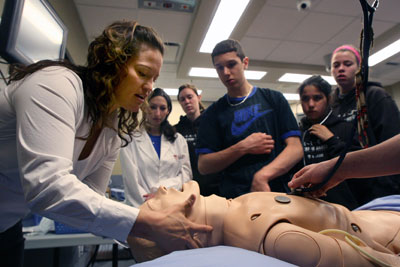
Mohawk Doctor Ojistoh Horn (far left) demonstrates a procedure at McGill's Medical Simulation Centre as medical student volunteer Odelia Borten and High Performance campers Aaron Saunders, Alex Gray, Chantal Augustine and Denise Jerome watch closely.
Owen Egan
High performance, high purpose
Camp focuses on more than just sports
During the weekend of May 18-20, you might have seen a crew of distinctive teenagers jogging up Mount Royal, running the track at Molson stadium or shooting hoops in the Field House. That weekend, the Aboriginal student population on McGill campus grew significantly due to the work of McGill University's First Peoples House and their second annual High Performance Camp.
The camp was created with support from the Eberts Family Endowment Outreach Fund, which was set up to provide outreach to the Aboriginal community in a meaningful way. It was developed with the understanding that, though the idea of higher education is not yet a priority in the eyes of all aboriginal households, sports excellence is, and playing a central role in the hopes and dreams of many young aboriginals.
As creator and coordinator of the camp, I drew upon my own experience. I came up with the idea from how my life was shaped. Though my first love was sports, my family always instilled in me the understanding that school was important and I had to strive for both in balance.
I understand that many Aboriginal athletes pin their hopes only on making the NHL or the Olympic Games. Such a one-dimensional view of success is a precarious path that can be more limiting than empowering. In response to this reality, the camp was designed to teach participants that the most successful people, superstar athletes or not, are able to balance academics, sports, family, personal relationships, health, culture and self-esteem.
This year, the camp focused on health careers, addressing the need for more health care professionals in Aboriginal communities. We partnered with the faculties of Medicine and Dentistry and the School of Nursing to introduce participants to the various career opportunities that were available to them.
Aboriginal role models from each discipline who shared their respective experiences with the group included Dr. Greg Fraser, who played for the McGill Redmen and completed his degree in dentistry here; pediatrician Dr. Kent Saylor; pallitive care nurse Janice Patton; and my sister, Dr. Ojistoh Horn, a McGill resident at the Jewish General Hospital who jumped at the chance to participate in the camp. It was important to all of us to show a 'native face' for each disipline to make these goals seem more attainable to the youth, and those lessons will stay with them long after their muscles stop aching.
The former captain of the Canadian Olympic water polo team in the 2000 Games in Sydney, Australia, Waneek Horn-Miller is the Coordinator of the First Peoples' House at McGill.

